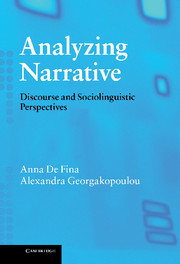Book contents
- Frontmatter
- Contents
- Acknowledgments
- Preface
- Note on transcription conventions
- 1 Narrative definitions, issues and approaches
- 2 Narrative as text and structure
- 3 Narrative and sociocultural variability
- 4 Narrative as interaction
- 5 Narrative power, authority and ownership
- 6 Narrative and identities
- Notes
- References
- Index
6 - Narrative and identities
Published online by Cambridge University Press: 05 June 2012
- Frontmatter
- Contents
- Acknowledgments
- Preface
- Note on transcription conventions
- 1 Narrative definitions, issues and approaches
- 2 Narrative as text and structure
- 3 Narrative and sociocultural variability
- 4 Narrative as interaction
- 5 Narrative power, authority and ownership
- 6 Narrative and identities
- Notes
- References
- Index
Summary
Introduction
In this chapter, we will discuss the multiple relationships that exist between narrative and identities, how links between the two have been conceptualized within different paradigms and what questions are raised by research in this field. In particular, we will look at biographical, sociolinguistic and conversation-analytic work on identity and explore similarities and differences amongst them, with the help of key concepts such as positioning, categorization, self-presentation and indexicality. Our general aim is to document and evaluate a shift in the field from psychologically based conceptions of identity largely centered on the individual self and its expressions in language to more recent views in which identity is seen as a process firmly grounded in interaction.
The first problem that every analyst is faced with when attempting to study the interactions between narrative and identity is the difficulty of defining identity itself. Although the latter has become one of the most important concepts not only in linguistics but in a variety of disciplines within the social sciences, it is surprisingly hard to find precise definitions and a basic agreement on them. This is because characterizations of identity vary according to the basic theoretical assumptions inspiring the researchers who have proposed them. In any case, definitions and choices of terms reflect the fundamental oppositions around which the debate over identity has evolved in the social sciences in general. Identity can be seen and defined as a property of the individual or as something that emerges through social interaction; it can be regarded as residing in the mind or in concrete social behavior; or it can be anchored to the individual or to the group. Furthermore, identity can be conceived of as existing independently of and above the concrete contexts in which it is manifested or as totally determined by them. Finally, it can be regarded as substantially personal or as relational. The methods for studying identities in language have been profoundly influenced by these alternative views.
- Type
- Chapter
- Information
- Analyzing NarrativeDiscourse and Sociolinguistic Perspectives, pp. 155 - 190Publisher: Cambridge University PressPrint publication year: 2011
- 1
- Cited by



